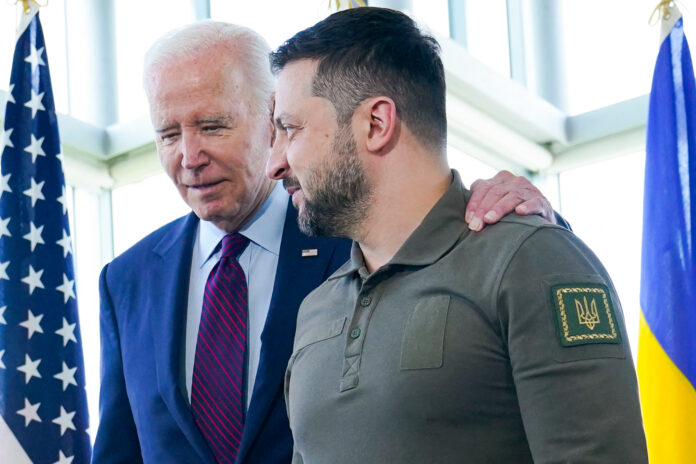- The White House said it does not condone attacks inside Russia, including Tuesday’s drone strikes on Moscow.
- Other Ukraine allies, such as the United Kingdom, have indicated Kyiv has the right to attack Russia.
- Russia’s ambassador to the U.S. said he believes the White House encourages Ukraine to strike Russian territory.
The United States has been a key ally for Ukraine throughout the war started by Russia, but the White House firmly stated that it does not support strikes inside Russian territory following the drone attack on Moscow.
Russian authorities on Tuesday reported multiple unmanned aerial vehicles (UAVs) had attacked Moscow, which resulted in damage to residential buildings but no known casualties. The Kremlin blamed Ukraine for the attack, but Ukrainian officials denied responsibility. The assault on Moscow followed a weekend that saw Russia bombard Ukraine with drone attacks, most of which targeted the capital city of Kyiv.
While Ukraine’s Western supporters mostly offered reserved comments about the Moscow attacks, some allies have stated Ukraine has the right to defend itself, even if that means making offensive maneuvers inside Russia.
The United States, however, reiterated it does not condone or encourage such strikes following Tuesday’s incident in Moscow.
Susan Walsh/AFP/Getty
“We have said this before, we do not support attacks inside of Russia. We’ve been very clear about that,” White House press secretary Karine Jean-Pierre told reporters Tuesday.
Meanwhile, U.K. Foreign Secretary James Cleverly told reporters that Ukraine “has the right to project force beyond its borders to undermine Russia’s ability to project force into Ukraine itself.”
While emphasizing that he wasn’t referring directly to the Moscow drone attack, Cleverly said that “legitimate military targets beyond its own border are part of Ukraine’s self-defense.”
Latvian Foreign Minister Edgars Rinkevics previously expressed a similar statement. Last year, he said Ukraine’s military should be allowed “to use weapons to target missile sites or air fields from where those operations are being launched.”
For its part, France supports Ukraine’s right to defend itself as long as French military equipment is not used to attack inside Russia, an official from the country said, according to Bloomberg.
On Wednesday, National Security Council spokesman John Kirby spoke at length about the stance taken by President Joe Biden administration in regards to Kyiv attacking inside Russia.
“We don’t tell them [Ukraine] how to conduct their operations. Ultimately, President [Volodymyr] Zelensky and his military commanders decide what they’re going to do from a military perspective, and they decide what they’re going to do with the equipment that has been provided to them and that they now own,” Kirby said during a press briefing.
He continued, “All that said, we have been very clear with the Ukrainians privately—and we certainly have been clear publicly—that we do not support attacks inside Russia. And we do not enable, and we do not encourage attacks inside Russia.”
But Russia’s ambassador to the United States said he doesn’t believe such statements and claimed the U.S. does in fact encourage Ukraine to attack inside Russia.
“What are these attempts to hide behind the phrase that they are ‘gathering information’?” Anatoly Antonov, Russia’s envoy to the U.S., said Wednesday on Telegram. “This is an encouragement for Ukrainian terrorists.”
Michael Kimmage, who previously held the Russia/Ukraine portfolio on the State Department’s policy planning staff, said he believes the White House when it states its position on the Moscow drone attack.
“I think for the U.S., they don’t like when this happens. It’s not the kind of escalation that the U.S. wants to see,” Kimmage told Newsweek.
He added that such strikes “may be tolerated as a part of the counteroffensive, because what it’s going to do is frazzle the Russians and force them to redistribute their army—which is stretched thin—to deal with some of these domestic problems.
“You can see how it has value in the context of the counteroffensive. But as a kind of regular practice, I would be very surprised if the White House was happy about this.”
Kimmage noted that Biden has “been very clear” from the beginning of the war that Russian President Vladimir Putin began 15 months ago that he’s against such escalatory attacks. Kimmage also said that since civilian buildings were hit during the Moscow strikes—which may have occurred as a result of drones being shot down rather than such structures being the intended targets—”a new narrative of the war” could be created by Russia.
“So far, Ukraine has been strong at maintaining narrative discipline,” where the theme has been Russia is the side that targets civilians, Kimmage said.
As for why other countries may indicate that they are more tolerant of such actions by Ukraine inside Russia, Kimmage said these allies have more leeway because they aren’t perceived to be on quite the same level as the U.S. in terms of support for Ukraine.
“In a way, the U.S. is a major player, so things are a little bit different for the U.S. You can understand why Biden might feel a little bit more caution,” he said.


